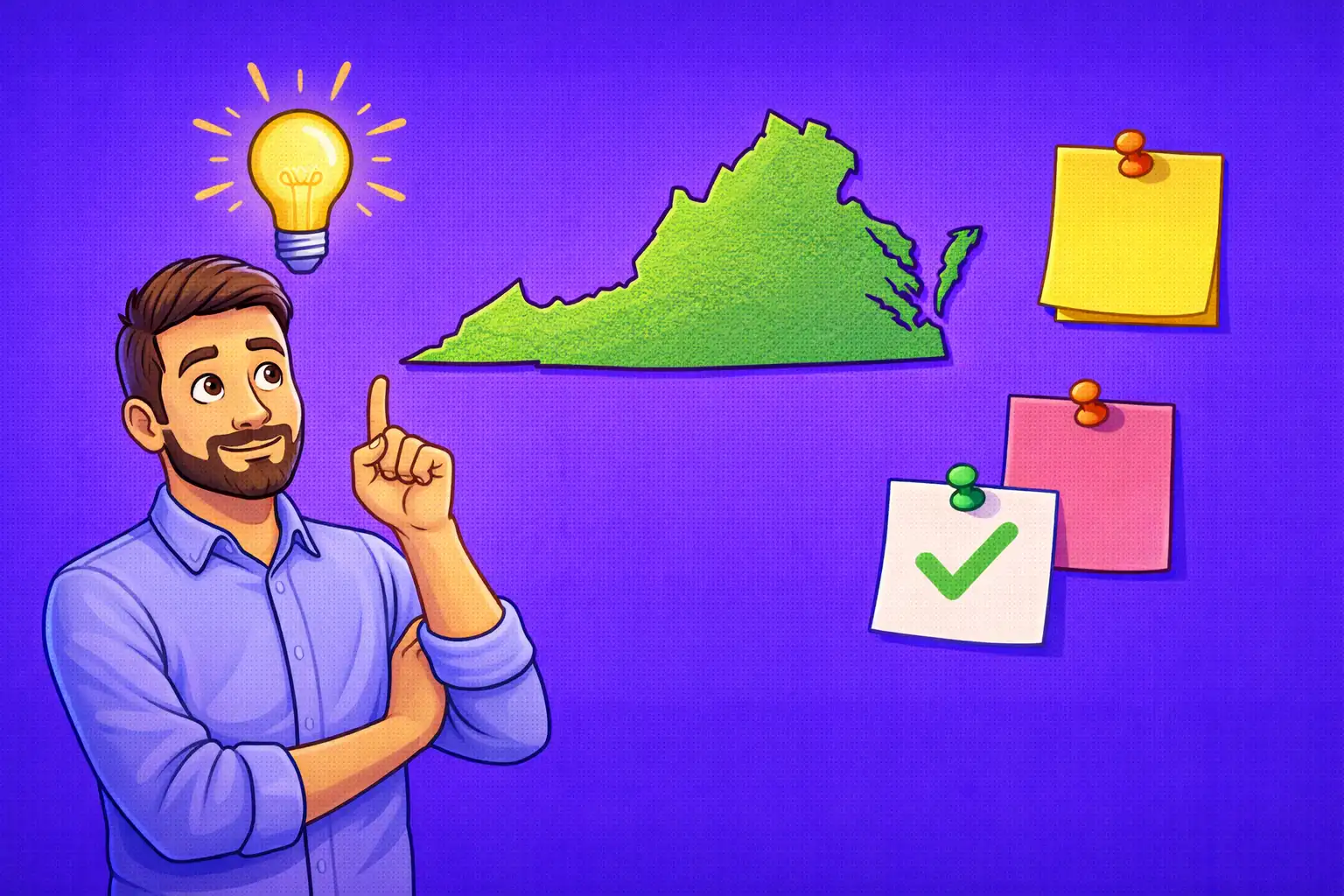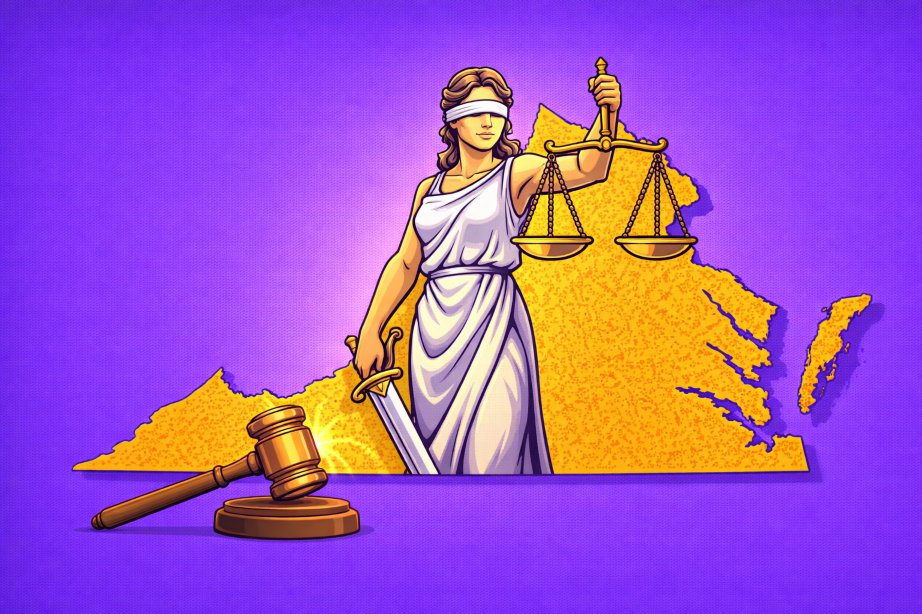We’ve gone through Virginia’s gambling laws and enforcement history to understand exactly why some Virginia sweepstakes casinos are still operating — and which ones no longer make the cut.


By Jerard V.
Sweepcasinos Choice
25,000 GC + 2.5 SC
By Jerard V.
Welcome bonus
200,000 GC + 20 Spins
By Nemanja M.
Welcome bonus
550K GC + 55 SC
Why you can trust us and our toplist
We don’t rank sites because they handed us an ad budget. Every platform here is legal to use in Virginia — as of this month — because it checks the boxes that matter under state law. If a site buries its free entry, mixes its prize coins, or plays games with the rules, it doesn’t make the cut. We check that monthly. Hard stop.
Want to see how we test them — and why some don’t make it?


⚖️ Legal status
Sweepstakes casinos aren’t officially licensed in Virginia, but they remain legal if they avoid the legal definition of gambling under § 18.2-325.
🔓 How they stay legal
No purchase required to win
Prize and play coins are clearly separated
Free entry (AMOE) is functional and accessible
Games don’t mimic banned slot-style machines
🧍 Who can play
Must be 21+
Must be physically in Virginia when playing and redeeming
Must pass ID and location verification
Site must explicitly allow Virginia users
⚠️ What makes a site risky
Uses the same coin for play and prizes
No real or working free-entry option
Avoids mentioning Virginia in terms
Skips ID or location checks
💸 Payout rules
Winnings are taxable (VA + federal)
1099 forms issued if you redeem $600+
Virginia won’t step in if your payout is blocked
👍 Our recommendation
Stick to sites with transparent terms, verified AMOE paths, and clear wallet separation. When in doubt, choose a social casino — no risk, no confusion.
Big-name sweeps sites you can’t use in Virginia
Here’s what has to be true for it to stay legal:
✔️ You didn’t pay to play — not even indirectly
✔️ Prize coins were earned, not bought
✔️ Free entry was easy to find and actually worked
✔️ Prize coins and play coins were clearly separate
Miss any of that, and Virginia law treats the site like illegal gambling under § 18.2-325 and § 18.2-331. You’re not on the hook as a player — but your prize is gone, and you’ve got no legal backup under § 11-14.
Not everyone gets to play — and even fewer get to redeem. These are the rules that actually decide whether the platform will let you in and pay you out:
✔️ You’re at least 21
Virginia law doesn’t set a sweepstakes age, but most platforms do: 21+. It’s not optional. If you’re underage, they’ll block your cashout.
→ Platform rule, not state law (but enforced hard)
✔️ You’re physically in Virginia
Where you live doesn’t matter — where you are when you play does. Sites geolocate you by IP or GPS. Out of state = locked out.
→ Required to avoid violating Va. Code § 18.2-325
✔️ Your ID matches
No ID needed to spin — but cashing out? You’ll need a government-issued ID, sometimes address proof too. One mismatch? No payout.
→ Enforced via platform terms, not state process
✔️ The site allows Virginia
If the site doesn’t list Virginia as an allowed state — you’re done. Some sweepstakes sites geoblock. The ones that don’t? Skip them.
→ Sites self-police to avoid gambling violations under § 18.2-331
Virginia doesn’t have a single law called the “Sweepstakes Casino Act” — but several key laws still decide what’s allowed, what’s risky, and what counts as illegal gambling.
Here’s what they look like, and why it’s important to know before playing:
| Law / Code | What it covers | Why it matters for you |
| Va. Code § 18.2-325 | Defines illegal gambling as betting for a chance to win a prize when chance plays any role. Includes skill games by statute. | If a sweepstakes casino doesn’t clearly separate purchase and prize coins, it could fall under this ban. |
| Va. Code § 18.2-331.1 | Civil penalties for gambling devices in unregulated locations — $25,000 per device. | If a site behaves like an unlicensed slot room, Virginia can hit it with massive fines. You’ll lose access fast. |
| Va. Code § 18.2-326 – § 18.2-330 | Penalties for illegal gambling, aiding, operating, or owning a gambling venue. | Using or promoting a noncompliant site can carry fines or misdemeanor charges — even for players. |
| Virginia Consumer Protection Act | Bans deceptive advertising, requires clear odds and terms for promotions and contests. | If the site hides its AMOE or makes you pay to enter, it’s noncompliant — and you’re at legal risk, too. |
| Charitable Gaming Code § 18.2-340.15+ | Applies to bingo, raffles, and other nonprofit-run games. | Doesn’t apply to sweepstakes casinos — but useful contrast for knowing what is regulated in-state. |
| Status | Explanation |
| ❌ No specific law yet | Virginia doesn’t have a sweepstakes-specific statute. The legality of sweepstakes casinos comes from how operators avoid violating existing gambling definitions under § 18.2-325. |
| ✅ Sweepstakes are legal if… | Sites offer free entry (via AMOE), don’t sell prize coins, and avoid mimicking slot machines or games of chance. Compliance hinges on structure, not labels. |
| 🔍 Monitored, not licensed | Sweepstakes casinos don’t get licensed by the Virginia Lottery or any other body — but they can still be shut down if they cross into illegal territory. |


If the platform screws up, you don’t get fined — but you also don’t get paid. Virginia doesn’t go after you as a player, but it won’t protect you either.
Here’s what you risk if a site looks legal… but isn’t.
You won with Sweeps Coins, but the “no-purchase necessary” path didn’t actually work? Virginia considers that gambling.
Under Va. Code § 11-14, your prize contract becomes void. The site owes you nothing.
→ You can’t sue. You can’t appeal. The law treats your win like it never happened.
Example:
You spent $50, then tried mailing in a free entry and never got a response. If that mail-in didn’t work, your win came from a paid entry — and that crosses the line into illegal gambling.
Some platforms delay payouts with endless ID checks. If your info doesn’t match — or they think you used a VPN — they’ll lock you out.
And because Virginia doesn’t regulate these sites, you can’t file a complaint anywhere.
→ The terms control everything. There’s no Gaming Board here to help you.
Example:
You win $250, upload ID, and they say your IP doesn’t match your state. Even if it’s wrong, you’ve got no in-state recourse. Your balance stays frozen.
Most sites don’t ID you until you cash out. But if your name, address, or geolocation throws a flag, they’ll freeze your account.
→ Virginia doesn’t regulate these sites, so there’s no help coming.
Example:
You win $200. Upload your ID. They say your location didn’t match. Now your balance is locked, and you can’t appeal it anywhere in-state.
You followed every rule. They didn’t. That’s still on you. If the platform fails to separate coins or provide a valid AMOE, the law treats your win like it never happened.
→ § 11-14: no valid contract = no legal payout.
Example:
Platform changes its prize coin policy without notice. Your last “win” was suddenly tied to a purchase. Doesn’t matter how legit it felt — it’s gone.
Virginia won’t tell you which sites are legit — but it will punish the ones that aren’t. That leaves you to read between the legal lines.
These are the signs a sweepstakes casino actually follows Virginia law — and won’t disappear with your payout.
✅ The free entry path works — and you don’t have to beg for it
Test it. If you can’t find the AMOE in two clicks, or your mail-in gets ignored, the platform’s already in dangerous territory.
→ Legal platforms handle this like clockwork — it’s not optional, it’s their foundation.
✅ Coins are split, and it’s obvious
You should always see two wallets: one for play (bought) and one for prizes (earned). If they’re blended, or prize coins can be purchased, you’re one step from § 18.2-331 trouble.
✅ Terms mention Virginia clearly
If Virginia is missing from their T&Cs, or their FAQ dodges state names? Skip it. A site that’s confident in its legality doesn’t hide where it operates.
✅ They verify your ID before you hit a redemption wall
If you can cash out before uploading ID, the site’s skipping basic compliance. That usually means something’s not clean in how they run prizes.
✅ There’s zero overlap with real-money gambling branding
Sites that blur the line — like calling themselves a “casino” and also offering “real money rewards” on the same wallet — risk being flagged under § 18.2-325. The good ones separate everything, down to the language.
Yes — if you win real cash (or redeemable gift cards), the IRS and Virginia both expect a cut. Virginia doesn’t tax sweepstakes platforms directly, but you’re still on the hook as an individual.
Yes. Virginia treats sweepstakes prizes like any other personal income.
→ What that means for you: If you win $600 or more in redeemable value (cash or gift card), you’ll need to report it on your Virginia state income tax return. Smaller prizes? Still reportable if they add up.
📚 Source: Virginia Department of Taxation; Va. Code § 58.1-322 (Individual income tax)
If you win $600+ in value, many sweepstakes sites will issue a Form 1099-MISC — that also gets sent to the IRS.
→ Heads-up: Even if the site doesn’t send you a form, you’re legally still required to report the win. Keeping a screenshot or email receipt helps.
📚 Source: Internal Revenue Service, IRS Publication 525 (Taxable and Nontaxable Income)
Only if they’re redeemable for real-world value.
→ Example: Buying Gold Coins doesn’t trigger tax. But redeeming Sweeps Coins for $25 in PayPal cash? That’s reportable income.
📚 Source: IRS Virtual Currency Guidance (because redeemable sweepstakes coins fall under barter and prize value rules)
If you’re playing regularly and earning more than pocket change, track your redemptions. Even “free entries” can turn into taxable wins once they convert to real value.
Two developments could reshape how sweepstakes casinos work in this state. Neither is law yet — but both are in motion. And both come straight from official government action.
In 2024, Virginia lawmakers passed a bill to re-legalize and tax “skill games” — machines that have been banned under Va. Code § 18.2-325 since 2020. But Governor Glenn Youngkin vetoed it before it took effect (Moomaw et al., 2024).
→ For you: If a sweepstakes casino mimics these machines — think slot-style spins, fast win loops, or coin systems that blur prize mechanics — it could be shut down under current illegal gambling statutes.
The Virginia General Assembly is conducting a study — active through the end of 2025 — to evaluate creating a centralized Gaming Commission that would oversee sports betting, racing, charitable gaming, and potentially sweepstakes sites (ICLG, 2024; Virginia General Assembly, 2023).
→ For you: If the commission is formed, sweepstakes casinos might face real regulation for the first time. That could mean age checks, prize audits, licensing — or limits on what sweepstakes platforms are even allowed to operate in Virginia.
Everything below helps you spot a legit sweepstakes casino in Virginia — and avoid getting ghosted on your prize.
Every line here is based on current state law or platform behavior.
Good sites verify your identity before you win big, not after. If they wait until you’re cashing out, they’re probably pushing risk your way.
→ Ask yourself: Can I upload ID now, not later?
📚 Source: Platform T&Cs (varies); § 11-14 on voiding prize contracts
You may never get a tax form — but if you redeem for real money, it’s reportable. Track it like cash income.
→ Even “free” wins can trigger state and IRS taxes if they’re redeemable.
📚 Source: IRS Publication 525; Virginia Dept. of Taxation, Va. Code § 58.1-322
The law doesn’t care where you live — only where you are when you play and redeem.
→ Out-of-state redemptions could break § 18.2-325 (illegal gambling across state lines).
📚 Source: Va. Code § 18.2-325–331.1
No mention = no support. If a site excludes VA or hides where it operates, that’s a signal.
→ Virginia isn’t banning sweepstakes casinos — but platforms do self-ban to avoid fines.
📚 Source: Va. Code § 18.2-331.1 (penalties for illegal device operation)
Don’t take their word for it. Request a mail-in Sweeps Coin path, follow the rules, and see if it actually gets credited.
→ If it doesn’t work, your next win could be voided under § 11-14.
📚 Source: Virginia Code § 11-14; Consumer Protection Act
Some fast-win sweepstakes games resemble banned “skill games.” If it looks too much like a slot, skip it.
→ Platforms mimicking illegal games can be shut down — your prize disappears.
📚 Source: Va. Code § 18.2-325; Virginia Supreme Court ruling (2023); Moomaw et al., 2024
The legal status of these sites changes fast. A compliant site today could get blocked tomorrow.
→ We check Virginia compliance monthly so you don’t have to.
📚 Source: ICLG Gambling Laws & Regulations: Virginia Chapter (2025), § 1.2
Right now, online sweepstakes casinos are skating on a technicality — not a greenlight. They exist legally in Virginia because they avoid the traps of illegal gambling law under Va. Code § 18.2-325. But that won’t last forever.
Two things to watch:
What does that mean for you?
More rules may come. But for now, it’s still all on you to spot the difference between “cleverly structured” and “flat-out illegal.”
If you’re playing sweepstakes casinos in Virginia, here’s what matters — based on real state laws and the mess players run into every week:
Check for separate wallets.
If a site lets you buy prize coins (not just Gold or Game Coins), that’s not a sweepstakes casino. It’s likely illegal under Virginia’s gambling code — and your payout won’t be protected.
Mail yourself some Sweeps Coins.
Yes, seriously. If the “no-purchase entry” system doesn’t work — or takes a month to credit — your wins could be void under § 11-14. Try it before you spend anything.
Avoid anything that plays like a slot machine.
Skill games are banned in Virginia (see § 18.2-325), and the more a sweepstakes site mimics one, the more likely it is to get shut down. You don’t want your prize caught in the middle.
Document your redemptions.
Platforms can change policies or freeze accounts without warning. Keep screenshots of wins, email confirmations, and anything you’d need if your balance vanished.
Track your earnings.
Virginia taxes any cash-out or redeemable prize. Even if the site doesn’t send you a 1099, the Department of Taxation still expects you to report it (Va. Code § 58.1-322).
Compare Virginia with its closest neighbor states
Social casinos are fully allowed in Virginia — no gambling laws to worry about, no prize red tape. Just play-for-fun slots, games, and leaderboards.
👉 See our top-rated best U.S. social casinos →
Yes, as long as the site follows Virginia law. That means you don’t pay directly to play, you’re given an easy free-entry method, and prize coins aren’t sold. If any of that is missing, it risks being treated as illegal gambling under Virginia Code § 18.2-325 and § 18.2-331.1. You won’t get in trouble as a player — but you also won’t get your winnings if things go south.
Yes, if what you win has real-world value — like PayPal cash or gift cards. You’re required to report those wins on your Virginia income tax return under Va. Code § 58.1-322. Most platforms will send you a 1099 form if you earn over $600, but even if they don’t, the IRS still expects you to report it.
Virginia law doesn’t set a minimum age for sweepstakes casinos — but every platform we’ve vetted sets their own age requirement at 21+. If you’re under that, your account and cashout will get blocked. And no, they won’t make exceptions.
You can sign up from anywhere, but to actually play or redeem, you must be physically located in Virginia. The sites use geolocation tools — like IP or GPS — to verify you’re inside state lines. If you travel, your access will lock until you’re back.
The site has to avoid all three elements that define illegal gambling: prize, chance, and consideration. It gets around the “consideration” part by offering a free Alternative Method of Entry (AMOE), usually by mail. If it blurs that line — like charging for prize coins or making free entry impossible — it breaks § 18.2-325 and puts you at risk of losing your winnings.
You’re probably not going to get fined or charged — but you also have zero legal protection. If the platform takes your money, freezes your balance, or refuses to pay, Virginia law won’t back you up. Under § 11-14, any contract with an illegal gambling operator is considered void.
Start by checking whether it clearly separates play coins from prize coins. Then look for a real, working free-entry method. Finally, check if the site specifically allows players from Virginia in its terms. If any of that’s sketchy, skip it — it’s not worth the risk.
Yes. Virginia doesn’t license these platforms, but it can still shut them down if they cross the line into illegal gambling. That includes fines of up to $25,000 per device or major civil penalties under § 18.2-331.1. And when that happens, player balances often disappear overnight — with no legal way to recover your prize.